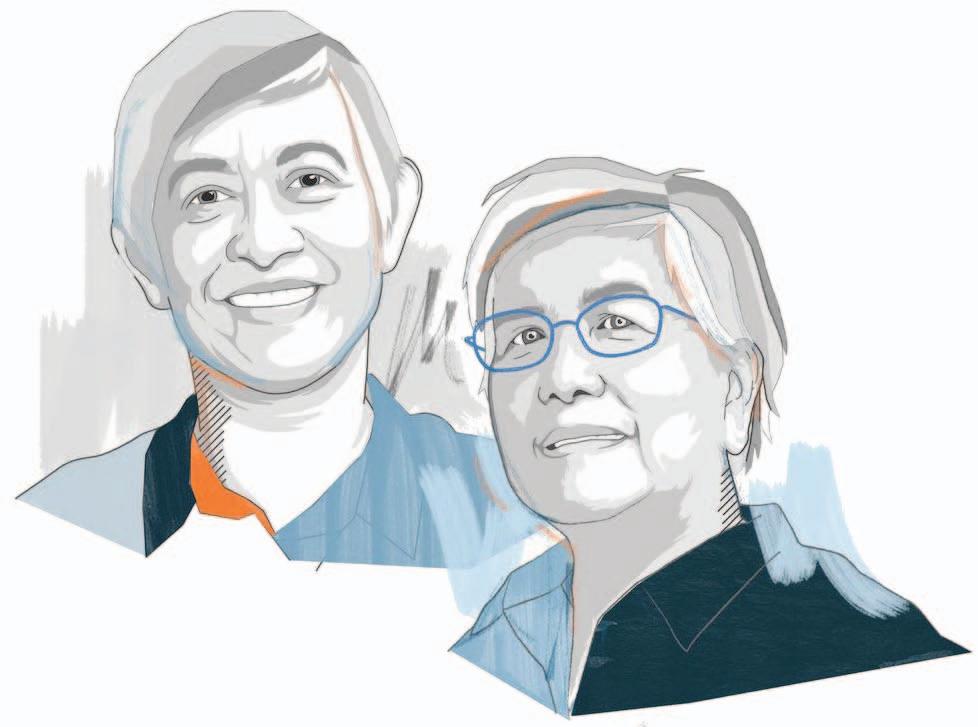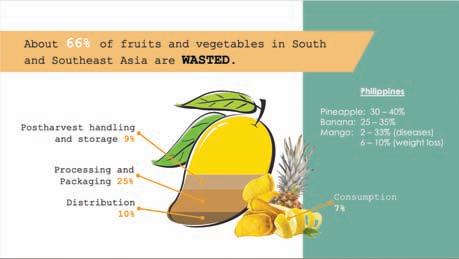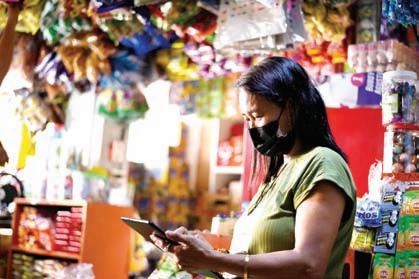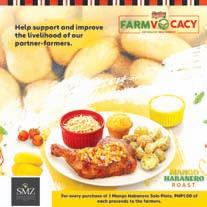
8 minute read
25 PEOPLE DEAD AFTER BUS CATCHES FIRE IN INDIA
MUMBAI, India—At least 25 people were killed and eight others injured after a bus caught fire overnight on an expressway in western India on Saturday, police said.
The bus was travelling to the city of Pune when it hit a pole and overturned after midnight, causing its diesel tank to catch fire, senior police officer Baburao Mahamuni told AFP.
“There were about 30-35 people in the bus. Twenty-five people have died and eight others are injured,” he said.
The injured, including the bus driver, have been admitted to a hospital near the site of the crash in Maharashtra state, about 400 kilometers (250 miles) east of India’s financial capital Mumbai.
Police said they had launched an inquiry into the crash.
“The priority at this moment is to identify the bodies and hand them over to their family members,” local media quoted police superintendent Sunil Kadasane as saying.
Images showed the bus engulfed in flames and later the charred remains of the vehicle overturned on the highway.
Three children were among the dead, a police officer told reporters.
“Deeply saddened by the devastating bus mishap in Buldhana,” Prime Minister Narendra Modi said on Twitter.
“My thoughts and prayers are with the families of those who lost their lives. May the injured recover soon.”
Maharashtra Chief Minister Eknath Shinde said he felt “deep grief” over the accident and pledged compensation of 500,000 rupees ($6,100) to the families of those killed.
Accidents are common on India’s vast network of roads, which are poorly maintained and notoriously dangerous.
The main causes are excessive speed, not wearing helmets—sales of two-wheelers far outstrip those of cars—and not using seatbelts.
India accounts for 11 percent of the global road death toll despite having just one percent of the world’s vehicles, according to a World Bank report released in 2021.
The same report estimated 150,000 car crash fatalities in India annually, or one person every four minutes.
It added that road crashes cost the Indian economy around $75 billion each year, with medical expenses and loss of income driving many accident survivors into poverty. AFP
Top Auditing Firm Names New Set Of Executives
AGRO-TECH FIRM OFFERS GREEN SOLUTION TO FRUIT SPOILAGE
FILIPINO scientists

Dr. Hidelisa Hernandez and Dr. Veronica Sabularse have never ceased to come up with propositions to help uplift and improve the lives of local farmers.
Already in their retirement years, both are not yet willing to hang up their hats as they feel a strong sense of responsibility to continue finding ways to help farmers improve their livelihood.
Using food waste, Hernandez and Sabularse developed a formulation to help prolong the shelf life of fruits. The product, a lifelong research by the two scientists, took more than 10 years in research and numerous discussions on how to democratize access to this product.

“The product is actually a fruit coating made from mango peels and other substances that are all organic. The idea of fruit coatings started as a proposal for student researchers. We came up with the idea that probably we could extract some material from waste products and come with a product that will create value to the waste,” Sabularse said.
Fruitect is an organic plant-based fruit coating that delays the ripening process of fruits. The product is manufactured in a plant located inside the UP Los Baños (UPLB) compound in Los Baños, Laguna.
The research, which spanned a very long and arduous journey, started two years after an official proposal was submitted to the Department of Science and Technology in 2010. Experiments on different plant wastes were conducted using mango peel, sugarcane bagasse, pineapple crown leaves and several plant residual wastes with potential for maximizing their functionality.
From among the plant wastes, the experiments arrived at one particular polymer which was used as base coating material, with a few other compounds added to the mixture. Nata de coco is also one of the natural materials added to the formulation as well cellulose non-whiskers.
The formulation has been tested on different fruits, but the differing physiology of fruits requires a different formulation that will work on each kind of fruit.
“We have to tweak the product to create a formulation that will work for each fruit type. We have tried on so many fruits and what we have, so far, is a formulation that works on mangoes. It is the first to be commercialized among other products,” Hernandez said.
Fruitect delays the ripening process of mangoes by another 6 to 10 days at room temperature and longer on cooler storage temperatures, prolonging the process for 20 days or more.
She said that while the process of experimentations and product development is strenuous and complicated, marketing the product is totally a whole different ball game which is not easy for scientists to venture into.
“Basically what we want is to improve the situation of farmers. But we also know how they are so averse into spending more. Added cost may lower their profitability, they say. But the benefit of using Fruitect®l will outweigh their concerns since this product will protect the fruits. Instead of bringing the fruits twice in a week to Manila or the destination is, they can transport big batches of fruits, say once in a week, and save on logistics costs,” Hernandez said.
“Hindi malalamog ang prutas even during long travel and the fruits will be safe from diseases and pests that are the usual cause of spoilage,” she said It is best to apply Fruitect on fruits that are already mature and ripe for picking, to get the optimum results, Sabularse said who is a food technology graduate from the University of the Philippines Diliman and holds a Master’s degree on food technology from UPLB and a PhD on food science with specialization in food chemistry and biochemistry from the Louisiana State University. Hernandez and Sabularse are coincorporators in a spin-off company created to market Fruitect.
While UPLB owns the technology to make Fruitect, HS InnoTech,l Inc. manufactures and markets the product independently. It is not owned by UPLB and operates distinctly from the university.
With the grants for research towards Agricultural Innovative Solutions (GRAINS), the Southeast Asian Regional Center for Graduate Study and Research in Agriculture supported HS InnoTech to start the operation of its pilot plant in UPLB. Awarded in 2022, the SEARCA grant funded the fabrication of support structures and test runs to produce up to 300 liters of Fruitect.
The spin-off firm is in talks with a few exporting companies for possible supply agreement that could provide economies of scale for small farmers who are interested to try the product.
In fact, a foreign company has recently placed query about Fruitect and looks like it is keen on technology.
“Sometimes, it is better to let foreign clients try the product first, because when Filipinos got wind that a foreign company is using this or that product, they easily get convinced to try the product for themselves. They have high regard for products that are used by companies from other countries,”
Hernandez siad
She said the entire process of developing the product was pretty much taxing, as it requires extensive amount of time and effort, “but what is more challenging is the resistance to cost of farmers or any other entities that have been accustomed to the traditional way of transporting their produce.”
“Coating the fruits will be an added step to the process. Farmers are not used to it. And the added expense is another hurdle for them,” she said.
Hernandez is a retired UPLB professor and a thesis adviser to many UPLB students.
She is a natural products chemist from UPLB and has a Master’s degree in Agricultural Chemistry also at the UPLB and a doctorate degree in Chemistry from the Louisiana State University.
Fruitect has been market-tested in carabao mango exports shipped to South Korea and China by a Davao-based trading company. The shipment arrived safely to their destinations with the fruits intact and in prime condition.
Othel V. Campos
B2b Platform Influences Small Retailers In Making Informed Decisions

PACKWORKS, a local startup that provides a business-to-business (B2B) open platform to sari-sari stores, is riding the wave of artificial intelligence (AI) and machine learning to help sari-sari stores across the Philippines make informed decisions in stocking their shelves.
“With access to Packworks, extensive and reliable dataset of sari-sari store transactions, we hope to equip our saripreneurs with the means to optimize their operations and drive growth in the highly competitive retail market,” said Packworks Advanced Analytics and Insights Manager Arch Tesorero.
The company is using time series forecasting to capitalize on Packworks,’ large and robust data on sari-sari store transactions to analyze and predict future trends in grassroots sales volumes across different locations in the country.
Using Sari.PH Pro application, Packworks provide predictions across all product categories sold in over 200,000 sari-sari stores nationwide and can run up to five years’ worth of daily transaction data. The model utilizes various machine learning algorithms to identify the most accurate and reliable predictions based on its ability to anticipate and align with real-time and current data trends.
The system tracks down information from its broad network of sari-sari stores that use the which provides store owners access to pricing tools, inventory management, sales and revenue tracking, and working capital loans.
By leveraging AI and machine learning, Packworks, aims to provide stores with additional information that can enhance their inventory planning processes. Retailers can gain a better understanding of consumer preferences and purchasing patterns through the model, leading to optimized product assortments, reduced stockouts, improved customer satisfaction, and increased profitability for the stores.
LEADING audit and tax advisory firm P&A Grant Thornton, welcomes the appointment of new company chairman and managing partner, Romualdo “Boyet” V. Murcia III, and vice chairman and deputy managing partner Olivier “Vier” D. Aznar. Outgoing chairperson and CEO Maria Victoria “Marivic” C. Españo and retiring managing partner and COO Leonardo “Jun” D. Cuaresma Jr., turned over the leadership to a competent set of partners after serving the firm for 26 and 35 years, respectively.
Murcia has risen through the ranks, showcasing exceptional leadership skills and extensive experience in public accounting. He joined P&A Grant Thornton because he resonated with the firm’s humble beginnings and commitment to excellence. He worked his way up from the Audit Junior position to where he is today.
He is currently the national president of the Association of Certified Public Accountants in Public Practice and held prominent positions in other professional organizations including the national association of CPAs, the Philippine Institute of Certified Public Accountants, where he served as president of the Southern Metro Manila Chapter from 2016 to 2017. Meanwhile Aznar has a unique blend of expertise as both a certified public accountant and a lawyer. With over two decades of experience in the auditing and professional services field, his hard work and determination led him to pursue both accountancy and law. His deep understanding of taxrelated matters and comprehensive experience in auditing will further enhance P&A Grant Thornton’s position as a leader in the industry.
Famous Diner Helps Mango Farmers In Advocacy Campaign

TO HELP uplift the livelihood of farmers, Kenny Rogers Roasters has initiated the Farmvocacy program where every purchase of a selected menu offering provides support to local farmers. This campaign strengthens the brand’s goal of offering delicious and healthy meals while recognizing the importance of farmers in the food industry.
Now on its second year, Kenny Rogers Roasters’ Farmvocacy is supporting local mango farmers in Zambales – the main provider of mangoes in the country – through Kenny Rogers Roasters’ Mango Habanero initiative.
For every purchase of Mango Habanero Solo Plate, Kenny Roger’s will donate P1 to local mango farmers, providing support to Samahang Magmamanga ng Zambales (SMZ) to help the group achieve its goals of promoting and producing high quality mangoes. The fast-food chain also assisted SMZ to create a common label and packaging for its local mangoes.
Through this initiative, the SMZ will be equipped to manage the supply of their mangoes better, and continually improve mango production by sharing best practices among its members and affiliates.









